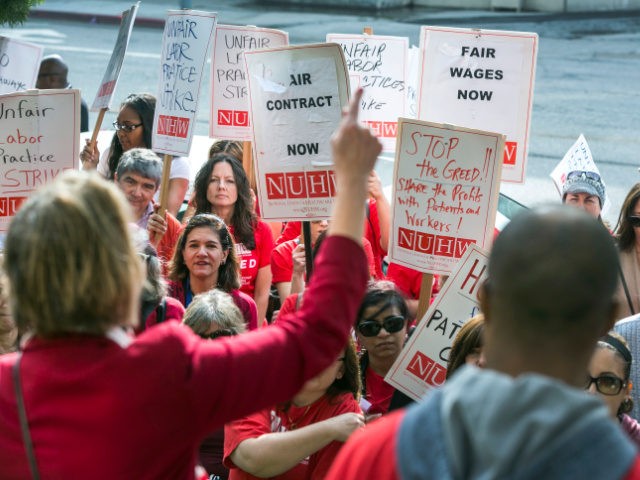Amid the coronavirus pandemic, thousands of Kaiser Permanente healthcare workers in Southern California and Oregon have voted to authorize a strike, citing staff shortages.
With nearly 96 percent voting in favor of the strike, the United Nurses Assns. of California/Union of Health Care Professionals (UNAC/UHCP), have entered into talks with Kaiser Permanente to avert what could affect hospitals in over a dozen Southern California cities, according to the Los Angeles Times.
Concerns about safety at work have led nurses to strike across the country over the last year. In July, about 1,400 registered nurses at USC Norris Cancer Hospital in Los Angeles and Keck Hospital of USC staged a two-day strike, citing concerns such as long shifts, not enough staff, and an overreliance on contract nurses. Nurses at San Francisco’s Chinese Hospital and Riverside Community Hospital also went on strike earlier this year.
The regional strike vote comes as negotiations are underway for a national contract between Kaiser and the Alliance of Health Care unions, which represents UNAC/UHCP as well as 20 other unions covering a total of more than 50,000 workers across the country.
Parallel to the UNAC/UHCP vote, United Steelworkers Local 7600 also authorized a strike Monday. The union represents about 7,000 healthcare workers, including housekeeping attendants, customer service representatives, and pharmacy technicians at Kaiser Permanente locations across Southern California.
Kaiser facilities in Anaheim, Bakersfield, Baldwin Park, Downey, Fontana, Irvine, Los Angeles, Ontario, Panorama City, Riverside, San Diego, West Los Angeles, and other cities would all be affected by the proposed strike.
UNAC/UHCP represents over 21,000 nurses, pharmacists, midwives, and physical therapists associated with Kaiser in Southern California. Union President Denise Duncan told the Times that staffing and retention are at the heart of the current conflict, adding that Kaiser has done little to alleviate the situation for healthcare workers that have been pushed beyond their limits.
Duncan expressed hope that the two sides can come to an agreement before the month’s end.
Arlene Peasnall, senior vice president of human resources at Kaiser Permanente, said that the company will continue to negotiate a proper contract while urging employees to not “walk away from the patients who need them.”
Beyond Southern California, The Oregonian reported on Monday that nearly “3,400 nurses and other workers at Kaiser Permanente in Oregon and southwest Washington have voted 96% in favor of authorizing a strike,” which comes as the company will surely lose staff over its vaccine mandate:
The timing of the strike comes at a difficult time for Kaiser and its employees. They are dealing with an unprecedented pandemic while facing a nationwide shortage of nurses. It is trying to cope with an unending caseload of COVID employees with frontline workers that are exhausted and disheartened.
And now, Kaiser faces the vaccine mandate, which almost certainly will lead to the departure of some of its employees. The health system has placed about 190 local employees on administrative leave, or about 1.5% of the active workforce, according to Mike Foley, a regional spokesman. They were placed on leave because they weren’t vaccinated and had not sought an exemption.
Arlene Peasnall said that Kaiser’s 52 facilities in Oregon will rely on physicians and “contingency” employees if the strike comes to fruition.
“Our priority is to continue to provide our members with high quality, safe care,” she said. “We are extremely grateful for our frontline health care employees, whose commitment to providing care and service throughout the pandemic has been nothing short of inspiring.”

COMMENTS
Please let us know if you're having issues with commenting.